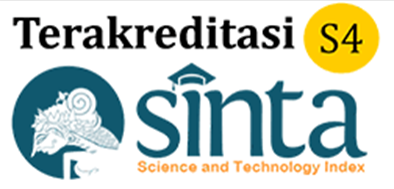Transisi New Normal: Bagaimana Masyarakat Rural dapat Bertahan?
Abstract
The Indonesian government has declared a new order to live side by side with COVID-19, through the idea of a "new normal". An interesting study to see how the Indonesian people respond to this new normal policy, especially in rural communities. So far, most discussions about the new normal have only been in the context of urban society. This study aims to identify the resilience of rural communities in facing the new normal situation. The method used is qualitative with a phenomenological approach. Data was collected using in-depth interview techniques with key actors. The research was conducted in Pulo Pitu Marihat Village, Ujung Padang District, Simalungun Regency, North Sumatra Province. This area was a red zone location when the pandemic took place, and most of the population worked in the informal sector which tended to be economically and socially vulnerable. The results show that people's ability to survive in the face of changes in the new normal transition period is influenced by individual resilience, social capital, natural resource environment, and social institutions.
References
Almedom, A. M., & Glandon, D. (2007). Resilience is not the Absence of PTSD any More than Health is the Absence of Disease. Http://Dx.Doi.Org/10.1080/15325020600945962, 12(2), 127–143. https://doi.org/10.1080/15325020600945962.
Andi Misbahul Pratiwi, Anang Fajar Sidik, Dede Rina, Eny Rofiatul, Fathimah Fildzah Izzati, Fransiska Limbengpiah, Hafidz Arfadi, Indrasari Tjandaraningsih, Mohammad Setiawan, Naimah L. Talib, Rizki Amalia Fathikhah, Susan Herawati, Y. S. A., & Vistamika, Y. (2020). Ekonomi Informal di Indonesia: Tinjauan Kritis Kebijakan Ketenagakerjaan (A. M. Pratiwi (Ed.)). Trade Union Rights Centre. www.turc.or.id.
Aulia, D. (2021). Dari Kelapa Sawit ke Buah Naga (Studi Tentang Alasan – Alasan Yang Mendasari Keputusan Konversi Tanaman Oleh Petani di Nagori Pulo Pitu Marihat Kecamatan Ujung Padang Kabupaten Simalungun). In Universitas Sumatera Utara. Universitas Sumatera Utara.
Awaludin, T., Lestari, A. W., Cahyadi, E., Savitri, E., & Yughi, S. A. (2020). Peningkatan Motivasi Diri dan Berbagi Bersama Warga Tenaga Kerja Informal Terdampak Covid 19 di Kelurahan Kukusan Kecamatan Beji Kota Depok. Dedikasi PKM, 1(3), 55–61.
Berkes, F., & Ross, H. (2013). Community Resilience: Toward an Integrated Approach. Society and Natural Resources, 26(1), 5–20. https://doi.org/10.1080/08941920.2012.736605.
BPS. (2020). Badan Pusat Statistik. https://www.bps.go.id/pressrelease/2020/11/05/1673/agustus-2020--tingkat-pengangguran-terbuka--tpt--sebesar-7-07-persen.html.
BPS. (2021). Perilaku Masyarakat Pada Masa Ppkm Darurat. BPS RI.
Carpenter, D. R. (1999). Phenomenology as method. Qualitative Research in Nursing: Advancing the Humanistic Imperative.
Chenoweth, L., & Stehlik, D. (2001). Building resilient communities: Social work practice and rural Queensland. Australian Social Work, 54(2), 47–54.
Drabek, T. E. (2018). Community Processes: Coordination. Handbooks of Sociology and Social Research, 521–549. https://doi.org/10.1007/978-3-319-63254-4_25.
Durkheim, E. (1973). Emile Durkheim on morality and society. University of Chicago Press.
Hendra Kusuma. (2020). Kerugian Negara Akibat Corona Bisa Tembus Rp 320 T. https://finance.detik.com/berita-ekonomi-bisnis/d-5037682/kerugian-negara-akibat-corona-bisa-tembus-rp-320-t.
IFRC. (2021). 2020 ANNUAL REPORT. https://www.ifrc.org/sites/default/files/2021-09/20210902_AnnualReport_ONLINE.pdf.
Imron, A., & Syafa’at, M. (2020). Revitalisasi Home Industry Berbasis Modal Sosial Sebagai Strategi Ketahanan Ekonomi Menghadapi Pandemi Covid-19. Prosiding Nasional Covid-19, 97–101. https://ojs.literacyinstitute.org/index.php/prosiding-covid19/article/view/45.
Iswahyudi, H. (2021). The persistent effects of COVID-19 on the economy and fiscal capacity of Indonesia. Jurnalekonomi.Lipi.Go.Id, 29(2). https://doi.org/10.14203/JEP.29.2.2021.113-130.
Jovita, H. D., Nashir, H., Mutiarin, D., Moner, Y., & Nurmandi, A. (2019). Social capital and disasters: How does social capital shape post-disaster conditions in the Philippines? Https://Doi.Org/10.1080/10911359.2018.1556143, 29(4).
Longstaff, P. H., Armstrong, N. J., Perrin, K., Parker, W. M., & Hidek, M. A. (2010). Building resilient communities: A preliminary framework for assessment. Securitypolicylaw.Syr.Edu. https://securitypolicylaw.syr.edu/wp-content/uploads/2012/09/Building-Resilient-Communities.pdf.
Macnee, C. L., & McCabe, S. (2004). Satisfaction with care among homeless patients: development and testing of a measure. Journal of Community Health Nursing, 21(3), 167–178.
Masten, A. S., Obradović, J., & Burt, K. B. (2007). Resilience in Emerging Adulthood: Developmental Perspectives on Continuity and Transformation. Emerging Adults in America: Coming of Age in the 21st Century., 173–190. https://doi.org/10.1037/11381-007.
Nikodemus Niko. (2021). New Normal: Perubahan Sosial Ekonomi dan Politik Akibat Covid-19. Gadjah Mada University Press. https://digitalpress.ugm.ac.id/book/282.
Rahman, F. A., Ruslanjari, D., & Giyarsih, S. R. (2022). Strategi Adaptasi Masyarakat selama masa Pandemi Covid-19: Studi di Desa Tegaltirto Kecamatan Berbah Kabupaten Sleman. Jurnal Kawistara, 12(1), 1. https://doi.org/10.22146/kawistara.67782.
Ruddin, F., Nurhabibi, P., & Saputra, B. (2022). Persepsi Risiko Bencana Pada Mahasiswa di Kota Padang Ditinjau dari Pengalaman dan Variabel Demografis. Jurnal Kawistara, 12(2), 229–242.
Sudjito, A. (2021). Kerentanan, Solidaritas Sosial, dan Masyarakat Tangguh. In W. M. dan P. S. Winanti (Ed.), New Normal: Perubahan Sosial Ekonomi dan Politik Akibat COVID-19 (pp. 253–263). Gadjah Mada University Press. https://doi.org/10.4067/S0717-69962021000100010.
Sukmana, O. (2005). Strategi Pemberdayaan Masyarakat Miskin Pedesaan melalui Pengembangan Institusi dan Modal Sosial lokal. Jurnal Humanity, 1(1).
Tamyis, A. R., Wikan, H., & Maward, S. (2021). Badai Yang Sama , Koping Masyarakat Rentan Pada Masa Pandemi Covid-19. Catatan Isu Smeru No.2/Nov/2021, 2, 1–4.
Todres, L., & Holloway, I. (2004). Descriptive phenomenology: Life-world as evidence. In New qualitative methodologies in health and social care research (pp. 99–118). Routledge.
WHO. (2020). Coronavirus disease (COVID-19) Weekly Epidemiological Update and Weekly Operational Update. World Health Organization. https://www.who.int/emergencies/diseases/novel-coronavirus-2019/situation-reports.
Worldometer. (2022). Total Coronavirus Cases in Indonesia. https://www.worldometers.info/coronavirus/country/indonesia/
Copyright (c) 2022 Pratiwi Nurhabibi, Rahmadhona Fitri Helmi, Iip Permana, Fajar Ruddin, Boni Saputra

This work is licensed under a Creative Commons Attribution 4.0 International License.













